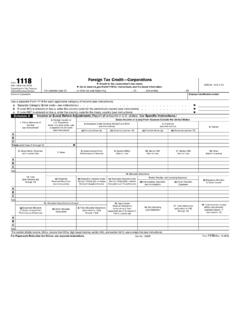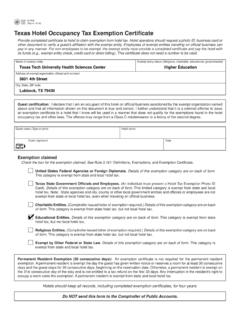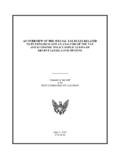Transcription of TURKEY CORPORATE TAX (KURUMLAR VERGISI)
1 TURKEY CORPORATE TAX ( kurumlar vergisi ) The basic rate of corporation tax for resident and non-resident companies in TURKEY is 20%. Corporations in TURKEY can be regarded as either limited or unlimited taxpayers. Unlimited taxpayers are liable for tax on their worldwide income. Limited taxpayers are subject to tax on income derived in TURKEY . Corporations are regarded as unlimited taxpayers if their statutory head office or actual business centre is located in TURKEY . Thus, foreign-owned subsidiaries wholly established in TURKEY are regarded as unlimited taxpayers whereas foreign branches are treated as limited taxpayers. A foreign corporation is regarded as a limited taxpayer in TURKEY and is taxable on its Turkish-sourced income only. The tax year is the calendar year although a special permit can be obtained from the Ministry of Finance for a different fiscal period.
2 Returns are due during the fourth month (until April 25) after the fiscal year end. corporation tax is normally payable in April. The taxpayer also has to pay an advance tax throughout the accounting period which is credited against the tax liability of the same period to be calculated in the return for that tax year. Residence A company is resident in TURKEY if its legal seat or place of management is in TURKEY . Basis Resident companies with unlimited liability are taxed on worldwide income; nonresident companies are subject to tax only on income derived from TURKEY . Taxable income All profits derived in the earning of income are included in taxable income, with the exception of dividends qualifying under the Turkish participation exemption. Expenses incurred in the course of the business are generally deductible.
3 Taxation of dividends See under "Participation exemption". Capital gains Capital gains derived by a company generally are taxable as ordinary income. However, 75% of capital gains derived from the sale of domestic participations are exempt from corporation tax if the following conditions are satisfied: 1. the property has been held for at least 2 years; 2. the gains are kept in a special fund account under shareholder equity for 5 years following the year of the sale; 3. the exempt profits are not transferred within the specified period to another account (except for transfers to the capital account by way of a capital injection); and 4. the consideration for the sale is collected by the end of second calendar year following the year of the sale. If the transferor company is liquidated in the 5 years following the year of the sale, the 75% exemption will be forfeited and the associated CORPORATE tax must be paid, together with a cash penalty equal to the tax not assessed as a result of the exemption and a delay charge interest (currently per month).
4 Capital gains derived from the sale of foreign participations that have been held for at least 2 years by an international holding company resident in TURKEY are exempt from CORPORATE income tax (see under "Holding company regime"). Losses Tax losses may be carried forward for 5 years but may not be carried back except where the company is liquidated. Tax rate 20% (30% if a CORPORATE taxpayer chooses to use the investment allowance exemption accumulated from prior years (if any). Surtax No Alternative minimum tax No Foreign tax credit A tax credit is granted for foreign tax paid up to the amount of Turkish CORPORATE tax attributable to the foreign income. Any part of the credit that cannot be used in a particular year may be carried forward to the following 3 years, but the foreign tax credit is limited to the Turkish CORPORATE tax attributable to the foreign income.)
5 The foreign tax paid must be documented through foreign tax office receipts approved by the Turkish consulate in the country in which the foreign tax was paid. Specific conditions apply to foreign tax credits relating to dividends received by resident Turkish companies from their foreign participations. Participation exemption Dividends paid by resident companies to other Turkish companies are exempt from CORPORATE income tax in the hands of the shareholder. Dividends received from nonresident companies are exempt from CORPORATE tax if: 1. the nonresident payer is a corporation or limited liability company; 2. the Turkish recipient has owned at least 10% of the paidin capital of the payer for at least 1 year; 3. the profits out of which the dividends are paid were subject to foreign income tax of at least 15% (20% if the main activity of the payer is the provision of financing, including financial leasing, insurance services or investments in securities); and 4.
6 The dividends are remitted to TURKEY by the date the CORPORATE tax return is due. Holding company regime To qualify as an international holding company, (1) a Turkish company must be a corporation ( an Anonim irket - A. ); (2) at least 75% of its total assets (excluding cash items) must be comprised of foreign participations that have been held for a continuous period of at least 1 year; (3) the Turkish company must hold at least 10% of the capital of each foreign participation; and (4) the foreign participation must be in the form of a corporation or limited liability company. Capital gains derived by a Turkish international holding company are exempt from corporation tax provided the foreign participation has been held for at least 2 years (see under "Capital gains tax"). Tax Incentives Various incentives are available.
7 An allowance is available to companies that carry out qualifying R&D (research and development) activities between 1 April 2008 and 31 December 2023. The allowance is equal to 100% of the R&D expenditure and is available in addition to the deduction of the R&D expenditure in the statutory accounts. Further, 80% (90% for employees holding a PhD) of the income tax computed on the wages of R&D personnel is exempt from income withholding tax, 50% of the social security premium contribution paid for each R&D employee will be compensated by the Ministry of Finance for 5 years (up to 10% of the total number of full-time R&D employees) and documents prepared with respect to the R&D activities are exempt from stamp duty. To qualify for the benefits, the R&D centre must be set up outside the designated technology development zones.
8 Income derived from the development of software and R&D activities carried out in technology development zones is exempt from corporation tax through 31 December 2013. Salaries paid to researchers, software programmers and R&D personnel also are exempt from income withholding tax through 31 December 2013. Companies operating in Turkish free trade zones (FTZ) based on a valid operation license obtained before 6 February 2004 benefit from tax exemptions; the exemptions for trading activities are abolished after that date. A tax exemption is provisionally available for manufacturing activities. An income tax withholding exemption under the FTZ Law is available for companies engaged in manufacturing within Turkish FTZs and that export at least 85% of the total FOB value of the products manufactured within the FTZ.
9 This exemption will be provisionally applicable until the end of the year in which TURKEY becomes an EU member state. A reduction of up to 90% of the CORPORATE income tax rate may be granted on earnings derived from investments in specified regions/cities and sectors. Withholding tax: Dividends Dividends paid to a nonresident company are subject to a 15% withholding tax, unless the rate is reduced under an applicable tax treaty. Interest Interest on loans payable to foreign states, international institutions, or foreign banks and foreign corporations that qualify as "financial entities" are exempt from withholding tax. A 10% rate applies to interest paid on loans from nonresident entities that do not qualify as "financial entities". Royalties Income derived from the sale or transfer of intangible assets such as copyrights, patents and trademarks, royalty payments, and payments for professional services such as consulting, supervision, technical assistance and design fees, are subject to a 20% withholding tax.
10 The withholding rate may be reduced under an applicable tax treaty. Branch remittance tax After-tax branch profits remitted to the headquarters are subject to a 15% withholding tax. Other taxes on corporations: Capital duty No duty is applied on share capital. However, there is a compulsory contribution to the Competition Board equal to of the capital amount committed when the company is established, and of any subsequent increase in capital. Payroll tax Employers are required to withhold tax at source on salaries at progressive income tax rates ranging from 15% to 35%. Real property tax Real property tax is levied based on the value of land or buildings. Rates are as follows: for buildings in general, for dwellings, for land in general; and for building sites.






